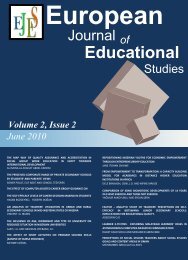How Libraries Contribute to Communities and Society - Ozean ...
How Libraries Contribute to Communities and Society - Ozean ...
How Libraries Contribute to Communities and Society - Ozean ...
You also want an ePaper? Increase the reach of your titles
YUMPU automatically turns print PDFs into web optimized ePapers that Google loves.
types were ―fixed set‖ in which the original combination of books remained unchanged <strong>and</strong> were rotated among<br />
different communities. The second type were ―open-shelf‖ which were collections made up for a specific<br />
community from a central general collection. Most of the books were fiction, with a few non-fiction titles. The idea<br />
was <strong>to</strong> encourage reading for the purpose of reading as a wholesome <strong>and</strong> uplifting recreation. Another interesting<br />
point <strong>to</strong> note is that the first rural service was not free. Every state except Delaware <strong>and</strong> California required the<br />
borrowing community <strong>to</strong> pay at least some of the transportation charges.<br />
As Stith <strong>and</strong> Klee (1983) have reported, telephone is another important <strong>to</strong>ol that had been used <strong>to</strong> provide library<br />
services in the rural areas. In this regard, telephone reference service includes all the calls that a library receives<br />
from its patrons. These calls may be request for direction or library hours or request for readers’ services which<br />
require checking the card catalogue or offering interlibrary loan services. Regardless of the level of reference service<br />
executed, every telephone call plays an important role in the library. In the rural setting the telephone’s critical role<br />
is intensified by the library’s geographical isolation from patrons <strong>and</strong> large libraries.<br />
The picture of rural library service in the developing world is not as bright as the one painted above. Aboluwarin<br />
(1998), Agboola (2000),Ikhizama <strong>and</strong> Okojie (2001) have documented the efforts of some libraries in information<br />
dissemination in rural areas of Nigeria. Nevertheless adequate attention has not been paid <strong>to</strong> library services in the<br />
rural areas of Nigeria. As Aboyade (1987) has observed, some librarians argue that because it is not yet possible <strong>to</strong><br />
adequately serve the city dwellers, who have the educational capacity <strong>to</strong> use library services, serving the rural<br />
dwellers, who are mostly illiterate would be a misdirection of efforts. <strong>How</strong>ever, the outcome of a modest pilot<br />
project aimed at giving library <strong>and</strong> information services in a rural setting which Aboyade (1984) set up in Badeku<br />
village near Ibadan in Oyo State of Nigeria has proved that argument wrong.<br />
At Badeku library service was provided in a building that was erected through the efforts of the village women. The<br />
building was often used as a meeting place for the villagers <strong>and</strong> other research teams. The library team visited the<br />
village on Fridays. Friday was the only work-free day in the village when people could spare some time <strong>to</strong> use the<br />
library.<br />
The project was an eye opener <strong>to</strong> the role of the library in the rural area. In the first place, the project has shown that<br />
the information needs of rural dwellers are many <strong>and</strong> diverse. They include interest <strong>to</strong> know more about farming,<br />
concern with cultural matters, public affairs <strong>and</strong> entertainment. Secondly, it has shown that the library can assist<br />
even rural dwellers in a country where the majority of the population are illiterate, but not unintelligent, <strong>to</strong> realize<br />
their aspirations quickly. Thirdly, it has been realized that non-literate rural dwellers can make effective use of a<br />
sophisticated institution like the library, when it is tailored <strong>to</strong> their own structure of information dem<strong>and</strong>. For<br />
example, the pilot project gave the people an opportunity <strong>to</strong> voice out their information needs. It was eventually<br />
found that they were most willing <strong>to</strong> utilize such information they requested for much better than any other type of<br />
information given <strong>to</strong> them.<br />
Moreover, it was surprisingly discovered that the villagers could benefit from other aspects of information that are<br />
not so functional. ―Sitting down in a relaxed atmosphere <strong>and</strong> listening <strong>to</strong> someone read <strong>to</strong> them was a completely<br />
new <strong>and</strong> pleasing experience <strong>to</strong> nearly all the patrons. In the traditional mode they were the ones required <strong>to</strong> retell<br />
folktales <strong>to</strong> children by moonlight. Now they themselves received similar pleasure from modern creative writings.<br />
Consequently, there were dem<strong>and</strong>s for more books than the project could afford. That was the only limiting fac<strong>to</strong>r <strong>to</strong><br />
the new horizon that broke before the people who could not read themselves‖ (Aboyade, 1987)<br />
.<br />
From the above one could see that the cultural purposes of a library are not limited <strong>to</strong> <strong>and</strong> appreciated by the refined<br />
members of the society who do not have <strong>to</strong> spend most of their time, like the rural dwellers, just <strong>to</strong> make ends meet.<br />
Therefore, reading or listening can play an important role in the beneficial use of leisure, in addition <strong>to</strong> what rural<br />
people normally do <strong>to</strong> fill their work-free hours. The library in a rural setting can consciously strive <strong>to</strong> help people <strong>to</strong><br />
cultivate a taste for books <strong>and</strong> reading.<br />
Above all, the project has demonstrated that the library, through some of its activities, can draw all interested groups<br />
<strong>to</strong>gether. This can be done by providing a forum in particular localities where all officials like agricultural extension<br />
officers, rural health personnel, community development officers, home economic agents <strong>and</strong> political field agents<br />
can obtain reference information <strong>and</strong> materials for their extension services. They will, through this, get <strong>to</strong> know <strong>and</strong><br />
use other materials that are not produced by their own institutions. This will also enable the library <strong>to</strong> intervene with<br />
200

















